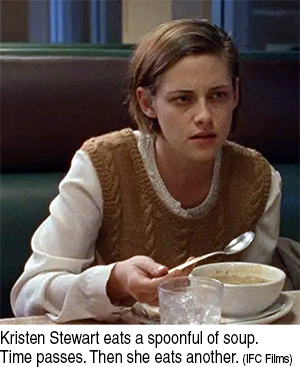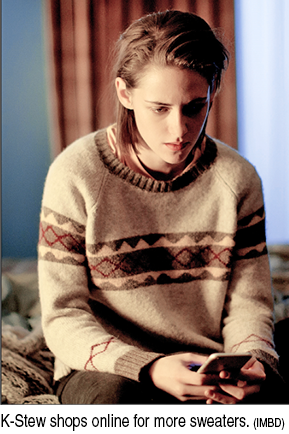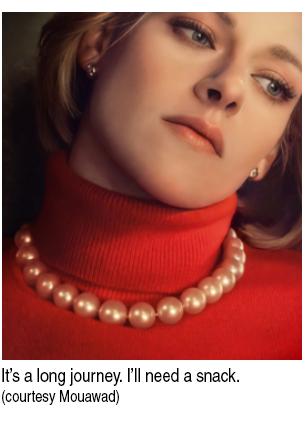Movie Review: Slowing Time with Kristen Stewart
As I neared my tenth year I decided I would no longer celebrate my birthday. This was not self-loathing so much as the fact that it falls late on New Year’s Eve. The night I turned nine I discovered that the yearly eruption of fireworks, gunshots and dynamite blasts lighting up our redneck backwater were not celebrations of me at all. I added this disappointing realization to the list of other standard childhood lies I had been fed, and vowed that going forward I would ignore the day as best I could.
Although this slightly reduced the annual number of gifts I would receive, it tended to obscure what I already sensed was the ferocious rush of time. But as the 70th anniversary of my entrance into the world approached I finally accepted that, despite my efforts, time, indeed, was passing at a pretty rapid clip. As T.S. Eliot wrote in A Song for Simeon, “My life is light, waiting for the death wind, like a feather on the back of my hand.”
I needed a way to slow down time. So I determined to watch a Kristen Stewart triple-feature.

I started with an obscure indie called Certain Women. Because I’d heard it was filmed in Montana during the winter and involves small-town lawyers I was certain nothing would happen. I wasn’t wrong. This turned out to be one of those Sundancey films with an ensemble cast that combines three separate yet vaguely connected stories. I had to wade through the first two segments involving first Michelle Williams and then the relentlessly unhinged Laura Dern in order to get to Stewart’s part. I wasn’t disappointed to discover that her character delivers one profoundly uneventful scene after another, as she demonstrates why she was chosen as the poster girl for the emotionally inert.
The act opens as a lonely ranch caretaker played by newcomer Lily Gladstone leads horses from their corral into the barn, puts them away in their stalls for the night, waters them and spreads out straw bedding. I begin to feel time slowing as these moments of what Marx called the idiocy of rural life drag on for what seemed like a happy hour. Finally, as darkness falls, Gladstone climbs into her pickup and drives into town. This is a remote burg near the Wyoming border called Belfry, perhaps named for the mental condition of people who choose to live in such a place. When she notices a few cars pulling into the parking lot of a school she decides to follow the drivers inside. Maybe she craves company. Or maybe she wants to see what would compel people to leave N.C.I.S. on such a bleak and empty night.
What has brought them here, alas, is Kristen Stewart. Or, rather, the lawyer she plays, who’s driven 130 miles to share her meager knowledge of the law as it applies to educators. They bombard her with questions such as how much lip they’re required to take off students, and how long they can keep expelled miscreants out of class. Stewart shrugs and blinks. Her eyes fidget and have dark circle under them. Time passes. We know this because we’re shown a clock whose second hand creeps toward nine p.m. Since I’m watching the film on my computer I replay this scene in slow motion by holding down the space bar, generating the weirdly gratifying pleasure I also get by frittering away time by prying open the shells of uncooperative pistachios.After class Stewart asks Gladstone where she can find food, then follows her new acquaintance to the town’s diner. As if observing a feeding scavenger, Gladstone watches Stewart gnaw on a cheeseburger and growl about the long drive to Belfry and the return trip home to the town of Livingston, a journey she will have to make twice a week for the next nine weeks. (She had agreed to the gig while still in law school, unaware of Belfry’s distance from what would become her day job.) Stewart’s world-weary face is a perfect illustration for the German flash card that says “Weltschmerz.” She leaves as Gladstone watches her disappearing sedan with what might be longing, or maybe the kind of curiosity elicited by coming across a strange bird.
For Gladstone the following days drag on from one episode of Hee Haw to another as she pitches hay, fills feed buckets, pastures the horses, brings them back in, and brushes them. Finally, it’s time to drive into Belfry again to look at Stewart teach her class, then eat. The diner is full of woe-begone locals who are short on words and take a long time to finish their soup. I am enthralled with how reluctantly each moment makes room for the next.
The next time Gladstone shows up at school she learns that Stewart has turned over the class to a local lawyer. She drives to Livingston and waits in her truck all night outside the law office until Stewart appears for work the next morning. They stare at one another for a spell. Finally, Gladstone says she has to go feed the horses. On the way back to Belfry she falls asleep at the wheel. Her pickup slowly veers off the two-lane, wanders through a barbed-wire fence and finally drifts to a stop in a grassy field. It’s a dreamy finale for one of the slowest thirty minutes of my life. I feel like I’ve stepped onto a cosmic Mobius Strip.
With great anticipation I hit the button to start my next journey on the time machine. Because Personal Shopper is set in France and involves K-Stew playing a professional buyer I guessed, again, that nothing would happen. The film begins as she wanders around a darkened old house in Paris that recently belonged to her twin, who suddenly died of a heart defect. She’s wearing white sneakers and a shapeless sweater the color of algae. She’s hoping to chat with her brother’s ghost. Time passes. Morning arrives. But no ghost. Next, we see her shopping for clothes and jewelry. This is her job, to buy stuff for her employer, an actress. Wearing a lumpy oatmeal-colored sweater that demonstrates why it’s called a sweater, she buys a shiny dress. She pulls at her hair, which looks like it has never been washed. She chews on her lip. Her hands flutter like little helicopters. She closes her eyes for a long moments, then opens them. She buys a purse. She buys leather pants. She buys another purse. Wearing a sweater the color of mud, she Googles. She rides here and there on her motorcycle. It rains. The sky is gray.

K-Stew takes a train to London and buys a dress. On the train she texts with her thumbs. Much of the film is spent showing Stewart texting with her thumbs. While she texts I see a small dark tattoo on her wrist. It’s the symbol for infinity, which looks just like a Mobius Strip. She takes the train back to Paris. She buys a watch. Because of the chance that she might keel over from the same defect that felled her twin, a doctor advises Stewart to avoid intense physical efforts and extreme emotions. This is like telling a Hasidic rabbi to avoid bacon. Stewart’s face registers emotions that run the gamut all the way from A to B and back again. She has what the literary critic Leslie Fiedler called the “Montana Face,” one developed not for feelings or sociability, but for staring into the weather.
She hates Paris and never speaks French. She also hates her job but can’t leave until she connects with her brother’s “presence” because she promised him that if he died before she did she would try to summon his spirit from the underworld. A quarter of the way through the film I am thrilled to hear her say, “I am waiting. I have to wait,” a signal promising that in addition to the fact that nothing has happened so far there are a whole lot of things still waiting not to happen.
However, I was disappointed when a couple of things did happen: a murder, a guy shoots a cop, and K-Stew hears a Boo! But because Stewart’s reaction to these events is muted, like her—the human silencer—they have little emotional impact. So I’m free to continue enjoying the palpable slowing of time. When the film finally ends after a hundred minutes I feel that a hundred hours have passed.
 However, when the Princess looks at a map while driving and says “Where the fuck am I?” I become concerned that she will head-on into an oak and thus terminate the movie before it gets a chance to drag on even more forever. She parks and walks into a fish and chips joint, much to the amazement of the rabble gathered inside. “Where am I?” she cooes. Later, still lost, she tries to stop a farmer on a tractor, but he ignores her. Then she sees a scarecrow in a field and spends a long time walking towards it. The sky is still gray. The scarecrow’s name is Berty. Berty is wearing her father’s hunting jacket. She takes the jacket and walks back to her car.
However, when the Princess looks at a map while driving and says “Where the fuck am I?” I become concerned that she will head-on into an oak and thus terminate the movie before it gets a chance to drag on even more forever. She parks and walks into a fish and chips joint, much to the amazement of the rabble gathered inside. “Where am I?” she cooes. Later, still lost, she tries to stop a farmer on a tractor, but he ignores her. Then she sees a scarecrow in a field and spends a long time walking towards it. The sky is still gray. The scarecrow’s name is Berty. Berty is wearing her father’s hunting jacket. She takes the jacket and walks back to her car.Meanwhile, a different car debauches the Queen at the front door of a castle. We know it’s the Queen because the car also debauches seven Corgis. The always creepy Timothy Spalding stands in front of the castle and checks his watch. Time passes. We hear the kind of jazzy bangy screechy music that’s meant to warn us that bad feelings will soon arrive. In fact, what finally arrives at the Castle is the Princess. The Royal family has been waiting for her so they can eat sandwiches.
Before sandwiches the Queen sits on a scale and Timothy Spalding weighs her. The Royals have a hobby of weighing themselves to make sure they’ve eaten enough. Then Spalding weighs the K Stew. She assures him that the bulk of her weight is jewelry. At dinner we learn that the Princess has an eating disorder. For most of the history of humans this malady has taken the form of starvation, but when it comes to the Princess this mean that she binges and barfs. We know this because after a string of large pearls falls from her neck into her soup she swallows one and dashes to the toilet to bring it up. I’m alarmed that she will choke, and her death will terminate the movie before it becomes even more uneventful. But thankfully, the Princess only imagines she swallowed a pearl. When she tries to retch by sticking her hand down her throat she is able to bring forth neither pearls nor puke.
The rest of Spencer is a collection of vignettes that have little connection to one another. This is exactly what I look for in Kristen Stewart vehicle. For example: Because Stewart likes to wander around in haunted houses the director has accommodated her. The spook in this case is Anne Boleyn, who lost her head in the sixteenth century while others were keeping theirs. The Princess is concerned she might be next and tries to dance away her fears in the deserted, cobwebby rooms.
In another scene the Princess tells her dresser: “Leave me. I wish to masturbate.” I was alarmed that the camera might actually show some of that, but luckily no self-love ever appears.
Ditto lesbian sex that follows a servant’s admission that she's in in love with the Princess “in that way.” I’m relieved when the only girl-on-girl action is the two of them dancing around one another and running on the beach.
In another scene servants beat the brush to flush pheasants into the air so the Royals can shoot and eat them. But the shooting abruptly stops when the Princess appears. This is what I’ve come to expect from Kristen Stewart, that when she appears all action ceases. She is, after all, a human black hole from which no light can escape.
Spencer ends as uneventfully as it begins. The Princess flees the castle and drives into the city to order fast food from KFC. She sits next to the Thames and eats. Then she turns her face to the sheltering sky.
On my birthday I’ll light a candle for Kristen Stewart. I know now that in order for me to live forever she can never stop working. [4/12/2022]